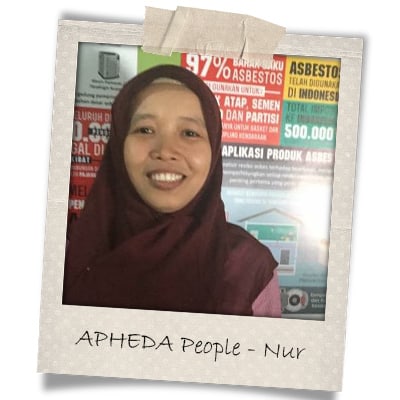Union Aid Abroad-APHEDA People: Meet Nur
Union Aid Abroad-APHEDA is about people – people working together to make things better for all. As the global justice organisation of the Australian union movement, each and every APHEDA supporter, member, partner, activist and participant here in Australia and all around the world contributes to the work it takes to tackle inequality and injustice.
Meet Nur.
Nur Hayati is a labour activist and factory worker from Serang District on the outskirts of Jakarta. In 2009, Nur was instrumental in organizing the women working in an asbestos textile factory in the town of Bogor – and she is now a leader in the union and in the campaign to see asbestos banned and eradicated in Indonesia.
What does it mean to be union to you?
Nur: To me union is about gathering for power and a movement to get our rights.
What does it mean to be APHEDA to you?
Nur: APHEDA is about supporting our struggle for research, campaigning and education about OHS and in particular asbestos.
Why do you think it’s important for APHEDA to grow its membership base, those contributing monthly to the work, to 20,000 by 2025?
Nur: Wow and amazing! This is the first time I’ve heard that membership of APHEDA is from personal people and not just support from workplaces. I think increasing members that join APHEDA will have a big meaning for its support for struggle and movements. More people joining APHEDA will help its independence.
How does your work relate to APHEDA?
Nur: APHEDA has big support for our work for asbestos education and campaigning in Indonesia where most workers have less knowledge about asbestos. We can’t rely that the government will ban asbestos production and consumption here. We could easily see asbestos consumption increase in Indonesia. People just know asbestos is cheap – but don’t know how dangerous asbestos is for their lives and that they live with a ‘silent killer’.
What part of your work are you most connected to/proud of? Why?
Nur: Organising and educating workers is an amazing activity. With them we don’t just share sad stories, but we use worker stories to make them struggle to get their rights and solidarity. We build capacity and awareness and struggle together.
What do you see as the work (areas, issues, etc.) that is most important for Union Aid Abroad to focus on into the future?
Nur: APHEDA has many areas of cooperation across many communities and countries. It’s difficult to choose because every place has different goals. For us, we hope APHEDA can continue its support for education and campaigning for OHS issues in Indonesia.
When you speak to people about APHEDA, how do you describe APHEDA’s work? Why would you recommend they join APHEDA?
Nur: I say let’s join with APHEDA! APHEDA has good programs, is independent, and your support will help another community. And the very meaning of our struggle is to make better work places – together we can make a difference!
